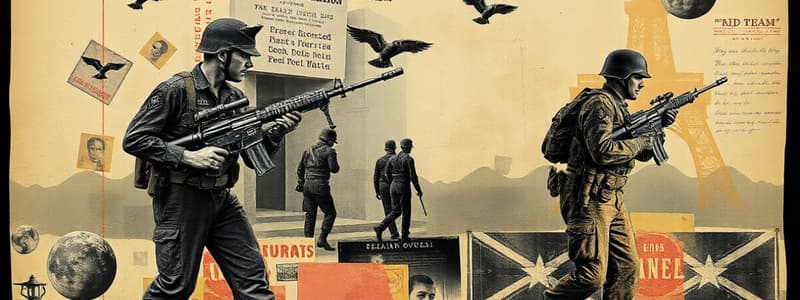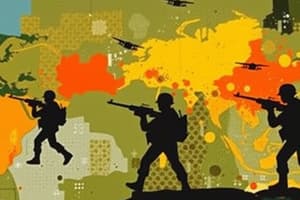Podcast
Questions and Answers
What is one of the primary reasons for managing physical terrain?
What is one of the primary reasons for managing physical terrain?
- To avoid fratricide (correct)
- To enhance information sharing
- To optimize resource allocation
- To promote collaboration between units
The information environment has no impact on the assignment of areas of operation.
The information environment has no impact on the assignment of areas of operation.
False (B)
What is the role of the IO officer during confirmation briefings?
What is the role of the IO officer during confirmation briefings?
To assist subordinate commanders and their IO representatives with understanding the commander's intent and specific tasks.
The analysis of the information environment during IPB leads to the understanding of aspects in which friendly forces have an advantage and where they are __________.
The analysis of the information environment during IPB leads to the understanding of aspects in which friendly forces have an advantage and where they are __________.
Match the implementation phase with its purpose:
Match the implementation phase with its purpose:
In the context of mobile communications, what could be deployed if cell towers are degraded?
In the context of mobile communications, what could be deployed if cell towers are degraded?
The IO officer does not participate in unit rehearsals before operations.
The IO officer does not participate in unit rehearsals before operations.
During which briefing do subordinate leaders give their understanding of the commander's intent?
During which briefing do subordinate leaders give their understanding of the commander's intent?
What is the primary role of the IO officer during internal coordination?
What is the primary role of the IO officer during internal coordination?
Internal coordination only occurs during scheduled IO working group meetings.
Internal coordination only occurs during scheduled IO working group meetings.
What types of operations does the IO officer deconflict with public affairs activities?
What types of operations does the IO officer deconflict with public affairs activities?
The IO officer monitors the progress of answers to IO _____ to stay informed of operational requirements.
The IO officer monitors the progress of answers to IO _____ to stay informed of operational requirements.
Which of the following is NOT a task performed during internal coordination?
Which of the following is NOT a task performed during internal coordination?
Match the following activities with their associated tasks in internal coordination:
Match the following activities with their associated tasks in internal coordination:
Training is conducted exclusively after planning is complete.
Training is conducted exclusively after planning is complete.
Why is internal coordination particularly important for IRCs?
Why is internal coordination particularly important for IRCs?
What is the primary role of the IO officer during the planning phase?
What is the primary role of the IO officer during the planning phase?
Branches and sequels are only developed during the execution phase of an operation.
Branches and sequels are only developed during the execution phase of an operation.
What is the main focus during the preparation phase?
What is the main focus during the preparation phase?
Coordination involves exchanging the information needed to __________ operations.
Coordination involves exchanging the information needed to __________ operations.
Which of the following is a necessary action for effectively conducting an attack on a high-payoff target?
Which of the following is a necessary action for effectively conducting an attack on a high-payoff target?
Match each term with its corresponding description:
Match each term with its corresponding description:
The IO officer's role concludes once the planning phase is completed.
The IO officer's role concludes once the planning phase is completed.
Why is assessing the current state of the information environment important?
Why is assessing the current state of the information environment important?
Flashcards
Internal Coordination (IO)
Internal Coordination (IO)
The process of coordinating efforts within a unit's headquarters to ensure smooth and effective information operations.
Who is responsible for internal coordination?
Who is responsible for internal coordination?
The individual responsible for initiating and overseeing coordination efforts within the unit headquarters.
What is an IO Working Group?
What is an IO Working Group?
Meetings where members of the IO staff discuss and coordinate their activities to ensure a unified approach.
What is an IO officer's role regarding OPSEC?
What is an IO officer's role regarding OPSEC?
Signup and view all the flashcards
How does the IO officer ensure internal coordination effectiveness?
How does the IO officer ensure internal coordination effectiveness?
Signup and view all the flashcards
Give an example of internal coordination related to MISO.
Give an example of internal coordination related to MISO.
Signup and view all the flashcards
What is the IO officer's role in staff training?
What is the IO officer's role in staff training?
Signup and view all the flashcards
How does internal coordination support IRCs?
How does internal coordination support IRCs?
Signup and view all the flashcards
What is the information environment?
What is the information environment?
Signup and view all the flashcards
What is information fratricide?
What is information fratricide?
Signup and view all the flashcards
How does the IO officer prevent information fratricide?
How does the IO officer prevent information fratricide?
Signup and view all the flashcards
Why is IPB crucial for information operations?
Why is IPB crucial for information operations?
Signup and view all the flashcards
What actions are taken to exploit information advantages?
What actions are taken to exploit information advantages?
Signup and view all the flashcards
What is a confirmation brief?
What is a confirmation brief?
Signup and view all the flashcards
Why does the IO officer assist with confirmation briefings?
Why does the IO officer assist with confirmation briefings?
Signup and view all the flashcards
Why does the IO officer participate in rehearsals?
Why does the IO officer participate in rehearsals?
Signup and view all the flashcards
Coordination in IO
Coordination in IO
Signup and view all the flashcards
Liaison in IO
Liaison in IO
Signup and view all the flashcards
OPLAN/OPORD
OPLAN/OPORD
Signup and view all the flashcards
Information environment assessment
Information environment assessment
Signup and view all the flashcards
Branches and sequels in IO
Branches and sequels in IO
Signup and view all the flashcards
Reviewing subordinate unit plans in IO
Reviewing subordinate unit plans in IO
Signup and view all the flashcards
Effective IO at all echelons
Effective IO at all echelons
Signup and view all the flashcards
High-payoff target
High-payoff target
Signup and view all the flashcards
Study Notes
Preparation
- Preparation involves activities by units and Soldiers to improve their ability to execute an operation. It creates conditions that enhance friendly force success.
- Early preparation is often necessary for Information Operations (IO) and Information Related Capabilities (IRCs) due to long lead times.
- Peacetime preparation includes creating databases of anticipated operations areas, for use in IO planning and defending friendly actions (e.g., network protection, operations security).
- Databases are updated continuously by participants in working groups to provide the IO officer with current info.
- Preparation considers factors like religious, ethnic, and cultural values, non-military communication infrastructure, military training, literacy rates, and influential organizations.
- Assessing unit readiness to execute IO is part of preparation. Commanders monitor preparations, compare them to initial plans, and look for variances.
- Preparation occurs at three levels: staff (IO officer), IRC units/elements, and individual soldiers. The IO officer has staff responsibilities and monitors other units.
- ADRP 5-0 Chapter 3 provides a comprehensive preparation overview.
- Key IO preparation activities include improving situational understanding, revising and refining plans/orders, coordinating, initiating information collection, security operations, troop movements, network preparation, terrain management, confirmations briefings, and rehearsals.
- Internal coordination involves issues like deconflicting MISO with public affairs, monitoring IO RFIs, checking air tasking orders, monitoring IRCs, etc.
- External coordination includes interactions with subordinate units, higher headquarters, support units, and IRCs. It integrates IO throughout the force, through assessing unit OPSEC, ensuring military deception synchronizes with overall operations, and validating assumptions.
- Liaison, where IO officers establish contacts, is crucial for external coordination and force protection.
- Initiating information collection ensures accurate and up-to-date situational awareness.
- IO officers work with G-2 (S-2) to update collection assets.
Improve Situational Understanding
- The IO officer/element must share their understanding of the information environment with the commander and staff.
- Information collection, coordination, liaison, and rehearsals help improve situational understanding, which is an ongoing process.
- Everyone, not just the IO officer, should update and refine this understanding due to information complexity.
Revise and Refine Plans and Orders
- Plans are not static; commanders adjust based on new information (analysis of unit preparations, IO intel, threat info).
- The IO officer adjusts relevant portions of operation plans (OPLAN) or operation orders (OPORD) and refines the IO running estimate, incorporating updated info on the adversary, weather, terrain, and friendly IRCs.
- IO input to the IPB needs to be kept up to date.
Conduct Coordination and Liaison
- Continuous coordination between units and elements is needed.
- Coordination involves exchanging information needed to synchronize actions.
- Most coordination occurs during preparation, with execution needing follow-through.
Studying That Suits You
Use AI to generate personalized quizzes and flashcards to suit your learning preferences.
Related Documents
Description
This quiz explores the key concepts of military preparation for operations, focusing on the activities conducted by units and soldiers to enhance their operational capability. It covers topics such as information operations, peacetime preparation, and unit readiness assessment. Engage with this quiz to test your understanding of how preparation influences mission success.




